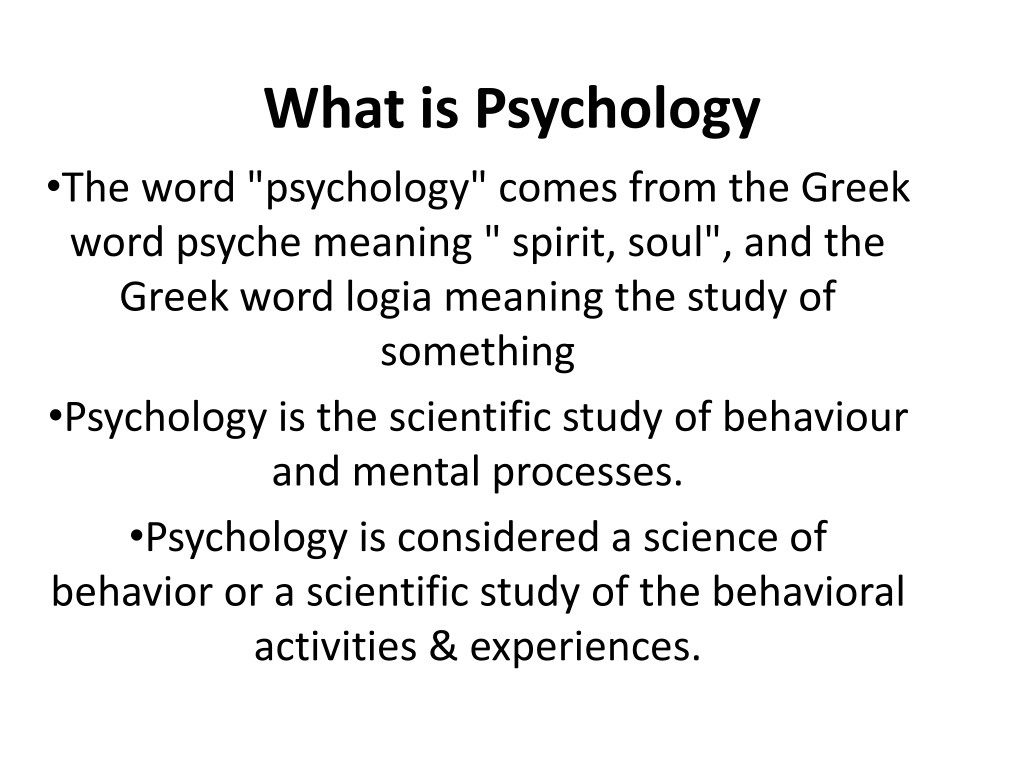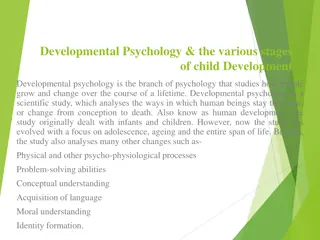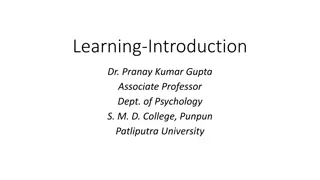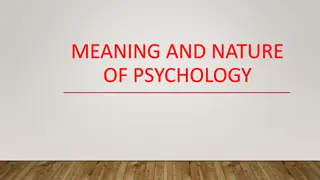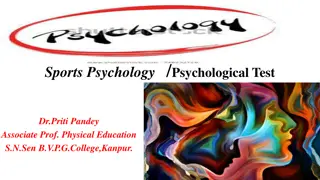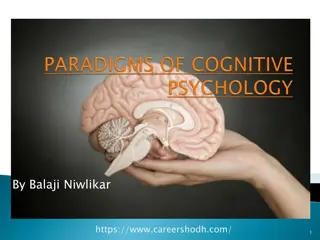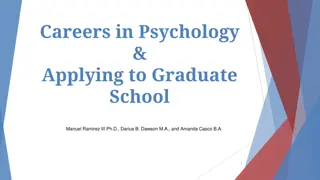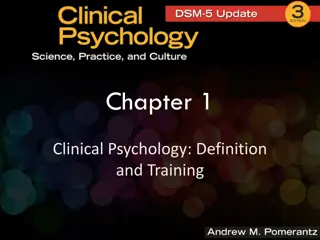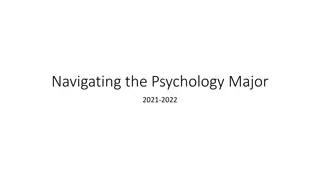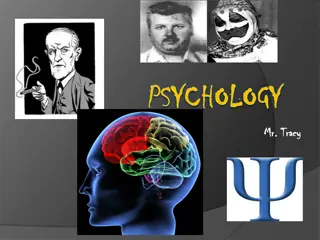Understanding Psychology: The Science of Behavior and Mental Processes
Psychology is the scientific study of behavior and mental processes. Psychologists study both observable behavior and private mental processes. The primary goals of psychology are to describe, understand, predict, and control behavior. Different branches of psychology, such as applied psychology, clinical psychology, counseling psychology, and social psychology, focus on various aspects of human behavior and mental health.
Download Presentation

Please find below an Image/Link to download the presentation.
The content on the website is provided AS IS for your information and personal use only. It may not be sold, licensed, or shared on other websites without obtaining consent from the author. Download presentation by click this link. If you encounter any issues during the download, it is possible that the publisher has removed the file from their server.
E N D
Presentation Transcript
What is Psychology The word "psychology" comes from the Greek word psyche meaning " spirit, soul", and the Greek word logia meaning the study of something Psychology is the scientific study of behaviour and mental processes. Psychology is considered a science of behavior or a scientific study of the behavioral activities & experiences.
Psychologists study Overt or observable behaviour, as well as Covert behaviour private mental processes that cannot be directly observed or measured and must be inferred from overt behaviour.
The primary goals of psychology are to: Describe behaviour what is the nature of this behaviour? Understand and explain behaviour - why does it occur? Predict behaviour can we forecast when and under what circumstances it will occur? Control behaviour - what factors influence this behaviour?
Applied Psychology Applied psychology uses the various fields of basic psychology to improve the quality of life of the human being in various fields like school, industry, hospital, consultancy and community.
Clinical psychology It deals with the evaluation, diagnosis and treatment of individual psychological disorders. Principal activities include interviewing the client, psychological testing, and providing group or individual psychotherapy
Counseling Psychology- it usually works with a somewhat different clients, providing assistance to people struggling with everyday problem of moderate severity. Thus they often engage in family, marital and career counseling
Social psychology It deals with interpersonal behavior and the role of social forces in governing behavior. It primarily focuses on attitude formation, attitude change, prejudice, leadership, conformity, attraction, aggression, intimate relationships and behavior in groups.
Organizational Psychology It is an outgrowth of industrial psychology and also known as organizational behavior . It tries to study and solve the different organizational problems exist in the school, hospitals, university, military, companies etc. Here it tries to solve the problems of leadership, group conflicts, conflicts, organization culture, organization development etc.
Educational psychology is mainly devoted to an understanding of the different aspects of the teaching-learning process. It is concerned with the application of the principles, techniques and methods of psychology to the teaching-learning process.
Environmental Psychology Environmental psychologists work in school, industrial and governmental settings. They design work environment and study the effects of crowding, noise and air pollution on behavior
Health psychology is the field that studies the role of the psychological factors in the promotion of health and the prevention of illness. It has the interest in relationship between stress and illness. It describes the interaction of biological, psychological and social factors. This model is known as Biopsychosocial model.
Forensic psychology Forensic psychology is a branch of psychology which relates to the law. The main part of forensic psychology is working with the criminal justice system. Forensic psychology is the use of psychological practices and principles and applying them to the legal system, mainly in court.
Sports and Exercise Psychology It involves the study of how psychological factors affect performance and how participation in sport and exercise affect psychological and physical factors. Sport psychologists teach cognitive and behavioral strategies to athletes in order to improve their experience and performance in sports.
Schools of psychology A school of thought, is the perspective of a group of people who share common characteristics of opinion , discipline, belief etc. A school is collection of people who put their ideas under the same umbrella, because these people have similar ideas , methodology.
Structuralism Wilhelm Wundt opened the door of the 1st Psychology laboratory in 1879 in Leipzig, Germany. He is regarded as founder of Psychology. He defined psychology as the study of consciousness. According to Wundt, if consciousness exists then it must have a structure. Structuralism also focused on breaking down mental processes into the most basic components. It means that we cannot study a stimulus as it is, but we need more study the small elements.
He thought that consciousness could be studied by INTROSPECTION It describe that what a person is feeling, after providing a stimulus to somebody and then ask him to tell about his/her feelings is called introspection. INTROSPECTION It refers to the observation and recording of the nature of one s own perception, thoughts and feelings; looking into one s mind; a mental self- analysis.
criticism Introspection can not be regarded as a reliable, objective and valid technique.
Functionalism Founder: William James. Functionalism school of thought was emerged as a reaction to structuralism. Functionalism emphasized function rather than structure of human consciousness. To study function 1) How the mind operates i.e how the elements of mind works together. 2) how mental processes promote adaptation.
mental tests , questionnaires, physiological measures in addition to introspection. common with structuralists & functionalist Both structuralists and functionalists still regarded psychology as the science of conscious experience.
Behaviorism Founder: John B. Watson Define School of psychology that studies only observable and measurable behavior. You cannot define conscious any more than you can define a soul. You cannot locate or measure consciousness, and therefore it cannot be the object of scientific study. Objectively studies through observable actions rather than thoughts and feeling that cannot be observed.
criticism They limited psychology to the study of the observable behavioral response given by organism to a stimulus. They did not explain consciousness and sub consciousness.
Gestalt Psychology Proponent: Max Werthiemer School of Psychology that studies how people perceive and experience objects as whole patterns. According to Gestalt thinkers, the whole is greater than the sum of its parts. Example When we see a tree, we see just that, a tree, not a series of branches.
criticism Gestaltists perform only in the area of perception. There approaches were not purely scientific.
Psychoanalysis Sigmund Freud Studied hypnosis and found the unconscious Believed that much of our behavior is governed by hidden motives and unconscious desires Maintained that many unconscious desires and conflicts are sexual. Believed that childhood experiences especially 5 years determined adult personality.
1.Psychoanalytic theory proposes that most of the mind is unconscious filled of conflicting impulses, urges, and wishes. 2. Freud asserted that the sex urges in the unconscious constitute the main human drive. This is known as the libido theory. 3. People are motivated to satisfy this impulses, ugly as some of them are. But at the same time, people are motivated to see themselves as decent, and hence may delude themselves about their true motives
Methods Dream interpretation, clinical investigation, free association. Criticism Psychoanalytic theory is not scientific. Too much emphasis on sex and aggression but did not fully explain consciousness and human behavior.
Humanism Proponent, Ibraham Maslow and Carl Roger It is developed in response of psychoanalysis and behaviorism Humanist psychologists viewed humans as a free agents capable of controlling their own lives, making their own choices , setting goals and achieves them. Humanistic psychology focused on individual free will, personal growth and the concept of self-actualization.
cognitivism Proponent: Edward Tolman and Jean Piaget Cognitive psychology is school of psychology that studies mental processes including how people think, perceive, remember and learn. Cognitive Psychology studies man s thinking, Perception, Language, Attention, Memory, Problem-Solving, Decision-Making, creativity and Judgment Intelligence
